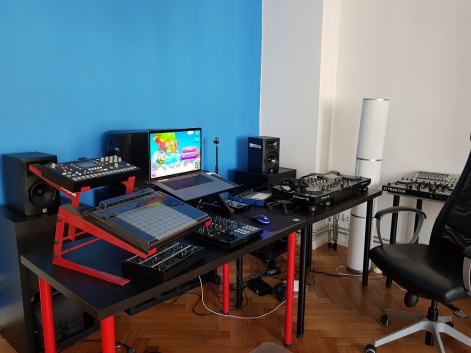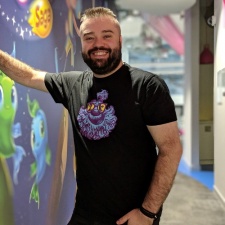The games industry plays host to a colourful cast of diverse individuals, from artists and coders to narrative designers and studio heads.
The skills to pull off these roles, however, are complex and differing, with each position requiring mastery in its field – especially in these complex times we are all living through at the minute.
To highlight some of the brilliant work that goes on behind the scenes as well as how employees around the world are adapting to the life of remote work, PocketGamer.biz is reaching out to the individuals who make up the games industry in our Jobs in Games: Remote Working series.
This week we spoke with King senior level designer David Briggs about how he is running live ops for Candy Crush Jelly Saga in the middle of a pandemic.
PocketGamer.biz: Can you tell us about your current role and what it entails?
David Briggs: I'm a senior level designer leading the team that is responsible for creating and maintaining all the levels for Candy Crush Jelly Saga.
How did you first get into games and how did you progress into this role?
I remember my Dad buying an IBM computer in the early 90s that came pre-packaged with a game called Gorillas. I was hooked from my very first banana toss, and from that moment on I spent as much time as I could playing games. Later on, I remember seeing an interview with a musician named Frank Klepacki talking about his experience writing music for video games. This was the first time that I ever really realised that making games were a viable career option, and it was one of the inspirations for pursuing music when I reached university.
My entry into the game industry came a few years later when I took a job on the customer service team at Big Fish Games. In essence, playing games and hearing from our customers was the core of my game design training.
No matter what genre you work in, knowing how to leverage data to determine if your design is working is a vital skill.David Briggs
Over time I was able to get an interview for a design position at Fresh Games, one of the publishing partners I had encountered at Big Fish. A few years later, moving from the US to Germany provided the biggest leap forward in my career as a designer, first working with Wooga and now with King.
What did you study (if anything) to get your role? What courses would you advise for aspiring professionals in the area?
Starting in customer service or a similar entry-level position is still viable today, many companies (including King) offer internship and training programs that allow people working in a different area of the business to get their foot in the door on the design side.
Now that I'm on the management and hiring side, I see a lot more people applying with specialised degrees in game design. Level designers in games like Candy Crush have a pretty unique challenge – most of the time you'll be working in small teams and you'll be responsible for creating new levels every week, while simultaneously ensuring that the many thousands of existing levels are fun and well-balanced.
The only way to be an effective designer at this kind of scale is to learn how to work with big data, almost becoming a hybrid data scientist and designer.
No matter what genre you work in, knowing how to leverage data to determine if your design is working is a vital skill. With that being said, making games is still more art than science so it's important to understand that data analysis alone is not all that is required to create moments of magic - you still need a solid foundation in design theory. I took a few architecture classes that were really inspiring and helpful.
The one thing that has served me better than anything else in my career is empathy. Simply put: taking the time to engage with players and to really try to understand what they're experiencing is vital. Take every opportunity you can to build more empathy for people who are potentially very different from yourself and you'll do well in life.
Do you think there are any misconceptions, public or professional, surrounding your area of expertise?
I think the one that comes up most often is the idea that working as a game designer means that I'm a programmer. In reality, my job is much closer to being an architect; I put together lots of plans that are usually carried out by highly skilled engineers.
What advice do you have for someone looking for a job in this profession?
You can do it! Even if you don't have a background or degree in games, if it's your passion, just start making games. Building up a portfolio of projects will help in your application. If you don't know where to start, find a community to support you. Most larger cities have regular Game Jams and meetups for people interested in making games. If there are no meetups in your area find a virtual community.
Most importantly, play lots of games in different genres, even games you wouldn't normally consider. Think about them from a design perspective – why they might have designed a system to work the way it does, or chosen to put the levels in that particular order.
How has the shift from office to remote working impacted your role, if at all?
All of my meetings are virtual and I've found that video conferencing is a bit less efficient than meeting in person. A lot of my meetings go over in time these days as a result. However, the people on my team seem to really be thriving, they've kept up their productivity and have been supportive of one another over the past weeks.
We've still been producing levels quickly and are preparing to release twice as many levels in Jelly soon. Working on a live game teaches you to be flexible very quickly and our team has absolutely risen to the challenge.
What does your typical day look like when working remotely?
Lately, I've been waking up, checking the turnip prices in Animal Crossing: New Horizons, then heading into the guest room/music studio/work from home office to start my day. There are tons of moving parts that keep live games like Candy Crush running smoothly. One of the reasons that I love working on live games so much is that each day has unique challenges that need to be solved in real-time.
One of the reasons that I love working on live games so much is that each day has unique challenges that need to be solved in real-time.David Briggs
On any given day we might release new levels, rebalance some levels that appear to be harder for our players than we originally intended, activate a live op, host a player testing session, create new levels, and more. The cool thing is that all of this can be done remotely, even player testing sessions!
What do you think are the biggest advantages and disadvantages of remote working?
The biggest advantage is cutting out the daily commute and getting a break from the open office plan. An open office layout supports my job in many ways, such as being able to quickly access my colleagues to ensure the operations of a live game are smooth.
However, it can also be disruptive if I'm trying to work on a more focused creative process like creating a level. For me, the creative tasks are done with far more efficiency at home but the collaborative tasks feel more labour-intensive.
Is there anything you wish you had known before moving to remote working?
On a really personal level, a family member in another country passed away last week so learning how to process through grief remotely is something that I wasn't well-prepared for and wish I knew more about. However, it has also been really beautiful to see so many friends and family all come together virtually to support each other as best they can.
In a strange way, it is comforting knowing that everyone in the world is going through some of these same feelings of separation at the same time. I wish comfort and peace to everyone who is struggling in these tough times.
When it comes to working from home, aside from wishing that I knew the duration of this social distancing period, I feel really fortunate to work on a team that already had some experience and preparation in place before the office closures were announced.
Do you have any advice for others who are struggling to adjust to remote work?
Hang in there, the world is going through this with you. I think in times like these it's important to practice radical self-acceptance – you are going through a truly unprecedented situation and there is no roadmap, so don't feel pressure or blame if you're not at your most productive. Don't look to others to measure success, you are on your own journey and that's totally okay.

With that in mind, also practice empathy. Give others the benefit of the doubt. Show compassion and understanding, because they may be going through even more than meets the eye. On the practical side, now more than ever it's best not to make assumptions. It's fine to check in and see if routine tasks were completed as normal. Overcommunication is the key to success.
After the pandemic ends and if you were given the choice, would you prefer to continue working remotely or go back to working in an office?
I'd like to find a way to have both. The output of each of the designers on my team has been really inspiring to see, but we also are feeling the effects of being socially isolated. I would like to explore adding more flexibility around regular work from home to our teams in the future.






















